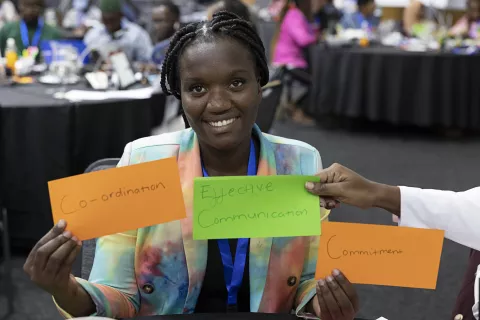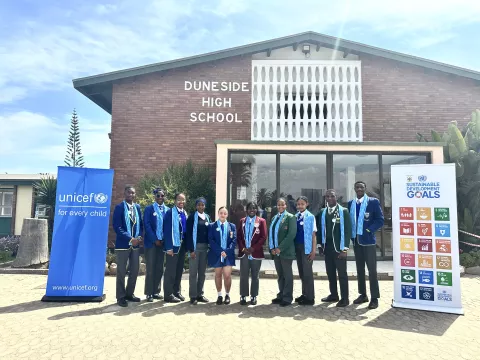Children and leaders from four Southern African countries renew their commitment to children’s rights
Leaders of Botswana, Namibia, Zambia and Zimbabwe rally around education and the climate crisis in Walvis Bay to mark World Children’s Day
Walvis Bay, 20 November 2023 – The Presidents of Botswana and Namibia, the Vice-President of Zimbabwe, and the Minister Community Development and Social Services of Zambia have joined more than 100 children to mark this year’s World Children’s Day at a summit in Walvis Bay, Namibia. The summit is a moment for children and their countries’ leaders to discuss solutions to accelerate action to protect and fulfill the rights of every child.
The summit takes place a year after the Presidents of the four countries met with children in Lusaka, Zambia, to commemorate the 2022 World Children’s Day. At this event, the four leaders committed to improving the quality of education for all children and ensuring that all schools are safe-to-learn settings and are connected to the internet. The leaders also committed to addressing underlying inequalities and the existing gender disparities that prevent girls and children with disabilities from reaching their full potential, and recognizing children and young people as essential actors in responding to the climate crisis.
This year’s World Children’s Day commemorations began on Saturday 18 November with a “March for Children’s Rights” in Walvis Bay. On Sunday 19 November, children and their countries’ leaders met to discuss progress made in advancing children's rights and keeping commitments from the previous year in the area of equal access to education, climate change participation, and tackling violence against children.
Children presented a call to action, specifically calling on their leaders to: improve the quality of education to meet the needs of today’s rapidly evolving world; ensure that children grow up and learn in an environment where they are protected from physical and emotional violence and can develop socio-emotional skills to deal effectively with the challenges of everyday life; increase understanding of climate change among children, as well as their involvement in devising climate-related strategies and programs; and guarantee equal education for all children, including children with disabilities.
“It has been great to exchange with children from other countries, learn about their challenges and share solutions that we can also implement in our countries,” said 17-year-old Aratwa from Botswana. “In Botswana for example, we are calling for improved access to education and health services for children in rural areas, so that all children in our country, everywhere they are, can have equal learning opportunities and good healthcare”.
“During our national consultative sessions this year, we conducted some interviews with children with disabilities and we realized that they are facing many challenges and exclusion,” said 14-year-old Nozipho from Zimbabwe. “Today we have asked the leaders of our nations to do more to protect the rights of children with disabilities and ensure that they have equal access to education.”
"The actions that resulted from the commitments the four Presidents made on last year’s World Children’s Day show that change is indeed possible when children and young people come together, come up with solutions to their problems and make their voices heard,” said Etleva Kadilli, UNICEF Regional Director for Eastern and Southern Africa. “But we must continue building on these achievements, so that the lives of children can be transformed and their rights fully realized”.
Over the last two years, Namibia has vigorously advocated for the implementation of the Sector Policy on Inclusive Education, which has resulted in increased access to education for children with disabilities. The establishment of the National Disability Forum in 2021, which consist of government, organizations of persons with disabilities, disability service providers, academia and the UN has gained momentum, and has been advocating on how to best mainstream disability across all sectors.
This year, Zambia launched the Standardized Statutory and Non-Statutory Case Management Tools to provide children at risk of abuse and exploitation with caring families or other safe settings, as well as access to services. The country’s Traditional Chiefs and Members of Parliament signed a commitment to end child marriage, and the country’s government also signed a Commitment to End Child Marriage and Harmful Practices at this year’s UN General Assembly. Zambia has also launched the National Child Participation Framework to promote and advance child participation and fulfillment of children’s rights.
The Government of Zimbabwe has enacted the Education Act that provides for basic state-funded education and retention of pregnant girls, the abolition of corporal punishment, and the provision sanitary wear. Together with the enactment of the Marriages Act, which criminalizes any act that promotes, permit, allow, coerce, aid or abet child marriage, this has created a conducive environment for the protection of children and access quality learning opportunities. The Government also approved the National Early Learning Policy to ensure children access early education at the right age. Zimbabwe has included a ‘child marker’ in the Nationally Determined Contributions (NDCs) Implementation Framework, recognizing the needs of children in the Climate Change National Adaptation Plan (NAP).
Through the Smart Botswana Digital Transformation Strategy, the Government has connected 609 schools to high-speed internet, empowering more than 387,000 students with access to e-learning and other digital tools. The Government has also procured 46,700 electronic gadgets which will be issued to teachers and learners across the country in 2024. Child friendly police centers have been established in selected Districts across the country to make it easier for children to report cases of abuse. The country has introduced stiffer penalties for perpetrators of sexual violence against children in efforts to deter offenders.
“Namibia is honoured to host this year’s World Children’s Day and provide a forum for our children to exchange with their leaders about the most pressing issues in their lives," said His Excellency Dr. Hage G. Geingob, President of the Republic of Namibia. “We are committed to continue empowering our children – including the most vulnerable – with knowledge and opportunities, and fostering a generation of leaders, innovators, and change-makers who will build a brighter and more prosperous Namibia."
"I wish that we could cement this collaboration with children and start to develop indicators of success so that by the end of four years, we can reflect on progress and see how much we've achieved. This is not an event but a process. We need to develop clear responsibilities for both children and the leaders," said His Excellency, Dr. Mokgweetsi Eric Masisi-President of the Republic of Botswana.
“Zimbabwe takes the rights of children seriously, that is why we have adopted several legal instruments to promote the rights of children and to protect them from exploitation and harm”, said Honourable Kembo Mohadi, Vice-President of the Republic of Zimbabwe. “Zimbabwe is particularly dedicated to the rights of children to expression and participation. To this aim, we have constituted a Child Parliament which advises our Government on child related issues.”
“Protecting children and empowering them with quality education is not just about building a brighter future; it's about equipping them to be the leaders our world desperately needs,” said Honourable Doreen Mwamba, Minister Community Development and Social Services of the Republic of Zambia. “This is why, following the introduction of the Education for All Policy, we are now committed to ensure infrastructure development, procurement of desks and the recruitment of teachers, for which we have increased the budget expenditure towards education. We are also ensuring the provisions of the Children’s Code Act are implemented for which we have developed the Child Safeguarding, Participation and National Alternative Care frameworks.”
World Children’s Day (WCD) is UNICEF’s global day of action for children, by children, marking the adoption of the Convention on the Rights of the Child (CRC) on November 20. On this day, UNICEF advocates, raises awareness, and raises funds for the most pressing issues facing children. It is a day to recognize children as rights holders, celebrate the progress that has been made for and with children, and to call on States to accelerate action needed to protect and fulfill the rights of every child, without discrimination.
Media contacts
About UNICEF
UNICEF promotes the rights and wellbeing of every child, in everything we do. Together with our partners, we work in 190 countries and territories to translate that commitment into practical action, focusing special effort on reaching the most vulnerable and excluded children, to the benefit of all children, everywhere.
For more information about UNICEF and its work for children, visit www.unicef.org.
Follow UNICEF in Africa on Twitter and Facebook



